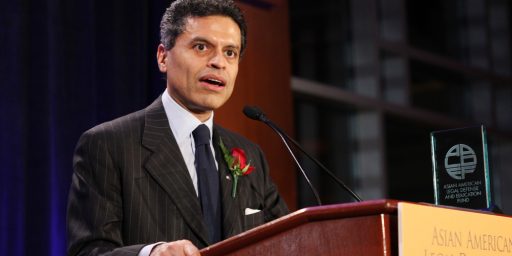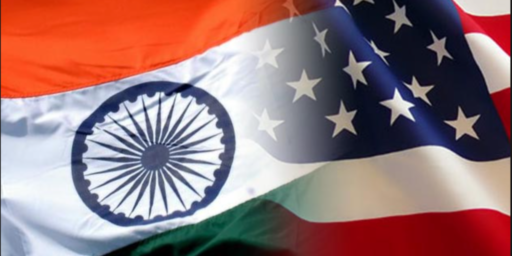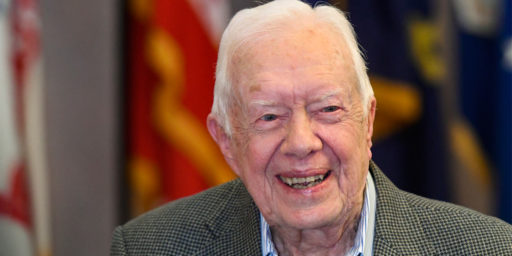U.S. Foreign Policy in the Post-Bush Era
Fareed Zakaria argues that John McCain’s foreign policy would be bellicose whereas Barack Obama’s would be conciliatiatory but, as Dave Schuler notes, both are “confrontational” and “interventionist,” just with slightly different priorities.
Zakaria points to a recent McCain speech:
Not only does it declare war on Russia and China, it places the United States in active opposition to all nondemocracies. It proposes a League of Democracies, which would presumably play the role that the United Nations now does, except that all nondemocracies would be cast outside the pale. The approach lacks any strategic framework. What would be the gain from so alienating two great powers? How would the League of Democracies fight terrorism while excluding countries like Jordan, Morocco, Egypt and Singapore? What would be the gain to the average American to lessen our influence with Saudi Arabia, the central banker of oil, in a world in which we are still crucially dependent on that energy source?
But this vastly overstates and misunderstands McCain’s proposals — not to mention the nature of the presidency.
McCain does not “declare war on Russia and China” or even place “the United States in active opposition to all nondemocracies.” Rather, he argues that we should seek to pursue our interests through the venue of an alliance with those with whom we share values.
He thinks Russia, which has not lived up to the bargain through which it was granted membership to which it was never due to the G-8, should be removed from that institution and that it should be expanded to include emerging economies that are on the same path as the core members of that group. Russia was not admitted to the club of the world’s greatest economies either through having a great economy or, as Zakaria asserts, “to recognize and reward it for peacefully ending the cold war on Western terms, dismantling the Soviet empire and withdrawing from large chunks of the old Russian Empire as well.” Rather, Boris Yeltsin showed up at the meetings and the other leaders didn’t really know what to do about it. Russia was finally admitted in 1997 after making agreeing to and reaching certain milestones but has backslid toward autocracy and regional belligerence in recent years.
China is an emerging economy and I agree with Zakaria that expansion of the G8 to include the likes of India but not China would be problematic. On the other hand, India is more-or-less democratic and complies with the rules of international law; China, not so much.
The idea that a League of Democracies would somehow lessen our mutal interest-based relations with Saudi Arabia and others is likewise puzzling. Does our membership in NATO do that?
Further, as Dave notes, while Obama is more open to diplomacy for its own sake than McCain, as demonstrated by his stated willingness to talk to the leaders of Cuba, Iran, and other states — which I support, incidentally — we shouldn’t pretend that he’s Jimmy Carter.
Sens. Hillary Clinton and Barack Obama are equally confrontational and interventionist. You can hardly interpret Sen. Clinton’s bellicose statements about Iran and her stump speech hostility to China or Sen. Obama’s stated willingness to intervene in Dar Fur or invade Pakistan in pursuit of Taliban and Al Qaeda finding safe haven there in any other way.
[…]
It looks very much as though come what may we’re going to have a confrontational interventionist president and we and the world had better get used to the idea. So much for mending fences and restoring the U. S.’s lost credibility.
Which, frankly, isn’t surprising. To become president of the United States, after all, one has to be elected by Americans. Our political culture demands a willingness to stand tough against rogue regime and to use military force against those who attack our interests. Even Jimmy Carter had his Desert One. And Carter was a one-termer largely because of his (minus that botched rescue mission) diplomacy-only response to the Iran Hostage Crisis.
Beyond that, as I’ve noted in previous posts, American presidents operate within the institutional confines of the office. The bureaucratic information process remains largely unchanged despite the changing of the occupants of the Oval Office. Congress continues to have essentially the same institutional stance as well, putting enormous pressure on presidents to conform to the expected role of the office.
None of this is to say that the November election won’t impact America’s foreign policy. It will. The personality, temperament, and preferences of the president very much matter, especially in world affairs. But the impact is not nearly as radical as Zakaria and others would have you believe.





“The personality, temperament, and preferences of the president very much matter, especially in world affairs.”
Wow! We’re in bigger trouble than I thought. John McCain will need a refresher course on that personality and temperment bit. His preferences are often similar to the other two anyway – save for terrorism. The question is whether or not he will seek the favor of the world’s liberal press the same as he seeks the favor of our liberal press? Any bets?
My own view on membership in the various international organizations is that the membership requirements should be objective, published, and automatic if you meet the prerequisites.
The problem with this, of course, is that it would reveal the inadequacies of the present crop of international organizations. It’s hard for me to see why Luxembourg, for example, has UN membership and Nebraska doesn’t, why France and the UK have veto-wielding seats on the UNSC and Japan doesn’t, or why the G8 isn’t the G9 i.e. China isn’t a member.
I agree with Dave on this. In addition, I would be more willing to buy into a candidate committed to the restructuring of current international organizations to fit Dave’s model rather than starting another one. We already have multiple, antiquated organizations; adding to that list just further diminishes their authority and purpose.
I find it extremely difficult to put any belief whatsoever in the stump speeches of Obama, or even Clinton regarding their foreign policies. Their credibility is rather suspect.
“while Obama is more open to diplomacy for its own sake than McCain, as demonstrated by his stated willingness to talk to the leaders of Cuba, Iran, and other states — which I support, incidentally — we shouldn’t pretend that he’s Jimmy Carter.”
Nobody thought Jimmy Carter would turn out like Jimmy Carter when Americans elected him.
Do we really want to go down the road again.
Just FYI, I linked to your article from Barbie Conquers Iran, Excerpt: …”without coercion, people will always choose to be like Americans. If Muslims were free to abandon their faith without fear of being whipped, tortured, burned and killed, and were exposed to American culture, in short order, Islam would cease to exist.”